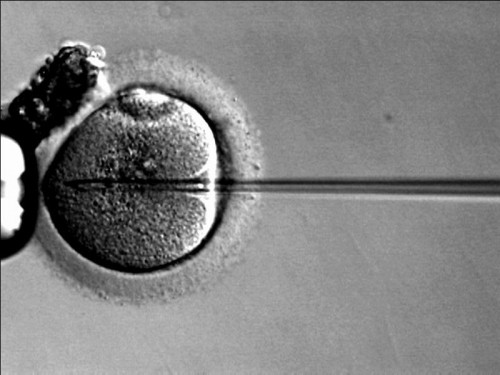Facebook and Apple are offering women employees the opportunity to “lean in,” which is great…right?
Humans both make and use technologies. Because of this, technologies themselves are imbued with politics, and the way people employ technologies have political implications. Untangling what those politics are, is sometimes a tricky process, as technological potentialities in both design and use are multiple and sometimes contradictory. Such is the case with egg-freezing technologies and the offer from Apple and Facebook to cover this procedure for women employees.
Since their announcement—a clear response to criticisms over Silicon Valley’s disproportionately dude populated work force—commentators have tried to discern the political implications. While the move certainly offers an opportunity for women who want to delay childbirth, it also presents a pressure to do so.
As Samantha Allan says in the Daily Beast:
While some female employees will undoubtedly benefit from this unexpected perk, the inclusion of egg-freezing coverage in an already male-dominated industry could make tech an even more hostile place for women who don’t want to make the choice between career and family…On top of dealing with notorious levels of sexual harassment… women in tech might be put under even more pressure to delay childbirth in favor of career advancement if company leadership has provided the means to do so. Given the tech industry’s problem with the retention of female employees, too, it’s hard not to perceive the inclusion of egg freezing coverage as an attempt to squeeze more value out of women before they abandon the industry altogether.
At its root, the policy brings us to fumble with the question: Is egg-freezing, as a covered procedure, feminist or anti-feminist? To grossly oversimplify feminism(s), the answer rests on the role of choice. Feminist technologies, in both design and use, open up choices to women. Anti-feminist technologies, in both design and use, place constraints on women.
The concrete question then becomes: Is it enabling to offer women employees the choice to freeze their eggs, or does it imply to women that they must put off motherhood if they wish to participate in this labor force? The answer, of course, is yes and yes. It is both feminist and anti-feminist; it offers choice but also shapes that choice.
All reproductive technologies carry politics of gender and power, and in the U.S., these gender-power politics are embedded in the logics of capitalism. It is therefore only within an unequal gendered system of capitalist logic that we can evaluate the political agenda of particular technologies and their implementation.
So let’s put egg-freezing into an economic and cultural context. Historically, social scientists show that within the workplace, women endure a penalty for motherhood, while men enjoy a bonus from fatherhood. That is, the role of Parent holds different consequences for men and women. Women, assumed to take on primary child care responsibilities, become professionally discredited. And indeed, the gendered division of child care labor does lead women to leave their careers. In contrast, men who become fathers presumably take on an heir of responsibility without the burden of divided time or attention, leading to positive workplace evaluations and material gains.
As a 31 year old woman, I see the anxieties of this reality in action on a regular basis. Many of my similarly aged friends are putting off kids in order to stay professionally competitive. In fact, many of these friends find their husbands and male partners pushing for kids, a push against which they have to negotiate. Of those who have had children, many (though not all) decided to quit their jobs and are staying home, at least temporarily. To be clear, all of these life choices are valid, but should be understood as part of a larger pattern, one reflective of a cultural and economic climate. It is this climate, and these choices, that play into the role of egg-freezing as a technology itself, and as an employer-covered procedure.
To cover egg-freezing, is indeed to offer choice. It also, however, imposes pressure. It is both feminist and anti-feminist. And it will remain such, until cultural and structural changes facilitate true gender equality.
Follow Jenny Davis on Twitter @Jenny_L_Davis


Comments 3
Not All Women: disarticulating feminization from female bodies » Cyborgology — October 31, 2014
[…] wrote about this when the news first broke. There, she […]
Not All Women: disarticulating feminization from women’s bodies » Cyborgology — October 31, 2014
[…] wrote about this when the news first broke. There, she […]
Hey Hun, can you stick those eggs in the freezer for a few? | Sociology with LDV — November 27, 2014
[…] http://thesocietypages.org/cyborgology/2014/10/21/hey-hun-can-you-stick-those-eggs-in-the-freezer-fo… […]